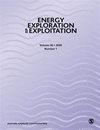Deep learning–based urban energy forecasting model for residential building energy efficiency
IF 1.6
4区 工程技术
Q4 ENERGY & FUELS
引用次数: 0
Abstract
Sustainable and inventive city design is becoming more and more dependent on the use of cutting-edge technology as smart cities develop further. Energy efficiency optimization in residential structures is an essential part of the puzzle as it helps conserve resources and keeps the planet habitable. An enhanced Deep Neural Network (DNN) model for household energy efficiency predictions is presented in this research. Our model uses a large dataset of building features, weather, occupancy patterns and energy usage histories. Data is preprocessed, features are engineered and hyperparameters are tweaked to improve DNN prediction. Scalable, easy-to-understand models are essential, as are shifting urban areas and energy landscapes. In this work, the authors have evaluated the proposed model with basic model with different optimizers. Initially, the Stochastic Gradient Descent optimizer applied that gained 91.02% Recall, 93.47% Precision, 93.28% F1-Score, 0.0153 MSE, 0.0166 RMSE and 0.0165 MAE. The proposed model gained 99.52% Recall, 98.91% Precision, 99.09% F1-Score, 0.0140 MSE, 0.0137 RMSE and 0.0139 MAE. By monitoring, analyzing and making decisions in real time, smart city systems can help planners understand energy usage trends. The optimized DNN model advances smart city development by promoting sustainability and resource optimization. Predicting residential buildings’ energy efficiency provides proactive energy savings, cost reduction and environmental impact mitigation. The suggested DNN model shows how smart cities use cutting-edge urban planning to become more sustainable, efficient and resilient.基于深度学习的城市住宅建筑节能预测模型
随着智慧城市的进一步发展,可持续和创新的城市设计越来越依赖于尖端技术的应用。住宅结构的能效优化是这一难题的重要组成部分,因为它有助于节约资源和保持地球的宜居性。本研究提出了一种用于家庭能效预测的增强型深度神经网络(DNN)模型。我们的模型使用了一个包含建筑特征、天气、占用模式和能源使用历史的大型数据集。通过预处理数据、设计特征和调整超参数来改进 DNN 预测。可扩展、易于理解的模型至关重要,不断变化的城市区域和能源景观也是如此。在这项工作中,作者用不同的优化器对所提出的模型和基本模型进行了评估。最初,采用随机梯度下降优化器,获得了 91.02% 的召回率、93.47% 的精确率、93.28% 的 F1 分数、0.0153 的 MSE、0.0166 的 RMSE 和 0.0165 的 MAE。建议的模型获得了 99.52% 的召回率、98.91% 的精确率、99.09% 的 F1 分数、0.0140 的 MSE、0.0137 的 RMSE 和 0.0139 的 MAE。通过实时监测、分析和决策,智慧城市系统可以帮助规划者了解能源使用趋势。优化的 DNN 模型通过促进可持续发展和资源优化,推动了智慧城市的发展。预测住宅建筑的能源效率可以主动节约能源、降低成本并减轻对环境的影响。建议的 DNN 模型展示了智慧城市如何利用最先进的城市规划来提高可持续性、效率和弹性。
本文章由计算机程序翻译,如有差异,请以英文原文为准。
求助全文
约1分钟内获得全文
求助全文
来源期刊

Energy Exploration & Exploitation
工程技术-能源与燃料
CiteScore
5.40
自引率
3.70%
发文量
78
审稿时长
3.9 months
期刊介绍:
Energy Exploration & Exploitation is a peer-reviewed, open access journal that provides up-to-date, informative reviews and original articles on important issues in the exploration, exploitation, use and economics of the world’s energy resources.
 求助内容:
求助内容: 应助结果提醒方式:
应助结果提醒方式:


